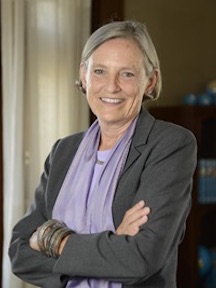By Nick A. Cohen
On an overcast day in early April, students, faculty, and members of the Minneapolis-St. Paul community gathered at Hamline University to listen to Lisa Anderson’s penultimate lecture as a Phi Beta Kappa Visiting Scholar. Anderson, the James T. Shotwell Professor Emerita of International Relations at Columbia University, is a specialist on politics in the Middle East and North Africa. In her talk, “From Truman to Trump: American Foreign Policy in the Middle East,” Anderson argued that the Middle East has held a unique position in American foreign policy less because of its intrinsic strategic importance than because it has repeatedly produced surprises that tested the political acumen of U.S. presidents and inserted domestic political dynamics into their decision-making.
Beginning with the creation of the state of Israel during Truman’s presidency, Anderson argued that the Middle East has been home to various unforeseen crises and conflicts that have prompted U.S. presidents constantly to react with immediate, and usually short-term, policy initiatives. This series of crises and responses has impeded refinement of a grand strategy in the region, resulting in the U.S. foreign policy establishment “caring a lot [about the region], but not knowing exactly what we care about,” as Anderson quips. (Anderson’s thesis is not crafted purely from academic scholarship; she was on the ground in the Middle East throughout the Arab Spring serving as the President of the American University in Cairo.) Each administration’s reactive response created political obligations for succeeding administrations, making the Middle East of outsized importance for domestic electoral politics, even though, in Anderson’s estimation, its strategic value has declined markedly over the 70 years since the end of WWII.
Today, the orthodox triptych of U.S. interests in the region (namely access to oil, supporting and sustaining Israel, and containing terror, both Soviet and Islamist) are weak rationales for U.S. involvement. The U.S. is more energy independent today than at any time in recent history, and has little to no business interests in the region outside of oil (I pose to you the same questions she posed to me: when is the last time you bought a product made in Egypt, or heard local news talking about weather reports in the Middle East because of a concern with agricultural exports?). The rationales for U.S.-Israeli relations are increasingly complex and uncertain. And terror in the world is hardly unique to the Middle East.
Anderson’s unorthodox perspective, perhaps unsurprisingly, met with some skepticism among the audience, although on the whole, the listeners seemed intrigued by her ideas and receptive to her novel perspective on U.S. foreign policy in the region.
As a ΦBK Visiting Scholar, Anderson’s tenure has been just as edifying for her as it has been for the students, faculty, and local community guests who benefit from hearing her talks and speaking with her in class. Having run a liberal arts college as the former President of the American University in Cairo, Anderson has “an interest in the liberal arts in the United States, how it developed, where it’s going, what the challenges are,” she explained. Visiting institutions of different sizes, religious affiliations, and curricular foci has given her “an appreciation for the diversity of higher education,” she said, and has offered a unique opportunity to compare institutions firsthand.
From those comparisons, Anderson has distilled several instructive similarities among institutions. Her lively discussions with students during classroom visits have challenged her conception about the fundamental tenets of a liberal arts education. “We tend to think of a liberal arts institution essentially as a curriculum, so you’re required to take courses in a variety of disciplines and ultimately you major, and in the meantime you’ve been exposed to all these subjects,” she said. “That’s what we conceptualize as ‘liberal arts’. But ‘liberal arts’ as a mode of education also means that most of the classes are relatively small and that students are expected to actively engage in confronting the material. I hadn’t really thought that the delivery method may be as important as the content.”
Anderson’s visits have also highlighted the failure of many institutions of higher education to encourage students to engage in conversations about ethics and morality. “Even in a liberal arts institution, these conversations have become so privatized that many students are left on their own – they’re supposed to get that somewhere else,” she related. Unexpectedly to Anderson, of the schools that she has visited, it has been those with extant religious affiliations that have been most engaged in questions of morality. In her estimation, specific moral guidelines lie at the core of these schools’ pedagogical philosophies, and students choose to attend religiously-affiliated schools in part for their ethical perspective on the world. Because of this, Anderson said she noticed a greater “willingness to engage in ethical questions and questions of morality, why we are living the way we’re living and how we should be living” at institutions with explicit affiliations with religious communities.
As her campus visits come to a close, Anderson is engaging in the most fundamental liberal arts exercise of all: constructive reflection. Her biggest lesson from the ΦBK Visiting Scholar experience has been the model of critical moral discussion practiced by the religiously-affiliated schools. In true scholarly fashion, her focus now is on how to best contextualize that lesson in the broader field of challenges to higher education. The question, she suggests, is “how to have a secular conversation around ethics and morals in the 21st century. Because one of the things that a liberal arts education should permit—indeed, perhaps require—you to do is to be self-reflective.”
Nick A. Cohen (ΦBK, Carleton College) recently completed his bachelor’s degree in international relations with a minor in European studies. Carleton College is home to the Beta of Minnesota chapter of Phi Beta Kappa.




